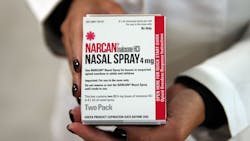In 2016, an average of 65 people per month were showing up in South Shore Hospital's emergency department in the throes of an opioid overdose, many of them fatal, as Massachusetts struggled to beat back an epidemic that was claiming more and more lives each year. By the end of 2016, the year's death toll would set a new record at 2,154.
"We had just some terrible weeks of multiple overdoses, multiple deaths," Dr. Jason Tracy, head of the hospital's emergency department, said. "That was very dramatic to our department."
Three years later, the nationwide epidemic of opioid addiction continues to claim lives by the thousands, ravaging communities across the U.S. and costing states millions of dollars in medical costs and lost productivity.
But in Massachusetts, at least, there are signs that the crisis has peaked. The number of people dying from opioid overdoses in the state fell slightly in 2017 after five consecutive years of sharp increases. When the numbers for 2018 are released next month, they are expected to show overdoses holding steady, state officials say. At the same time, ambulance companies are reporting slightly fewer overdoses and doctors are writing far fewer opioid prescriptions to avoid putting patients on a path toward addiction.
The decline in overdose deaths is even more pronounced in individual communities, including Quincy, where fatal overdoses dropped from 42 in 2017 to 32 last year, and Weymouth, where overdose deaths fell from 38 to 11.
Experts can't point to a single reason for the decline. After five years and millions of dollars spent trying to slow what at times seemed like an unstoppable scourge, there is little consensus among state officials, doctors and advocates about how Massachusetts turned the corner while the rest of the country suffers soaring opioid deaths.
Some point to the growing availability of medically assisted addiction treatment in the state, while others credit the wide deployment of naloxone, an overdose-reversing drug now carried by police officers, firefighters and, increasingly, civilians. Some point to a growing network of recovery centers, peer-support groups and post-overdose outreach programs established to guide people into treatment and help keep them on course.
No one, however, is ready to celebrate.
An estimated 1,518 people in Massachusetts died from opioid overdoses in the first three quarters of last year — the most recent period for which statewide data is available — down only slightly from the estimated 1,538 who died during the same period in 2017. The fatality numbers for 2018 due to be released next month are expected to show only that deaths have "stabilized," said Ann Scales, spokeswoman for the state Department of Public Health.
The decline in overdoses, both fatal and nonfatal, reported by ambulance operators is also slight, from 10,128 in the first half of 2017 to 9,855 in the first half of 2018.
"It's going to take time, obviously, and people have to be patient," said Quincy police Detective Lt. Patrick Glynn, a nationally recognized expert in the use of naloxone by law enforcement officers. "You're not going to see the dramatic numbers drop because the treatment itself takes a period of time."
Overdose numbers tell only part of the opioid epidemic story.
A study last year by researchers at Boston Medical Center found that as much as 4.6 percent of the state's population — nearly 1 in 20 people — have some degree of what researchers and clinicians now call "opioid use disorder." Another report, by the Massachusetts Taxpayers Foundation, attached a staggering price tag to the epidemic for lost worker productivity, health care and public safety response: close to $5 billion for Massachusetts businesses, almost $2 billion for state government and more than half a billion dollars for cities and towns.
Yet the slight decrease in opioid deaths in Massachusetts stands in contrast to the rest of the country. Nationwide, the number of people dying from opioid overdoses continued to soar in 2017, increasing from more than 42,000 in 2016 to just over 49,000, according to estimates by the National Center for Health Statistics.
"Everybody else is on the way up," said Dr. Jeffrey Baxter, an addiction treatment specialist and medical director for Spectrum Health Systems, which has two treatment facilities in Weymouth.
The decrease in Massachusetts also flies in the face of a flood of fentanyl, a synthetic opioid vastly more potent, and more deadly, than heroin. The drug, which can be prescribed legally but is largely produced illicitly, showed up in 90 percent of toxicology screenings that followed opioid overdose deaths in the state in the first half of 2018, compared with only 37 percent for heroin alone. Fentanyl has also been showing up in other drugs, even marijuana.
At the same time, there are signs that prescription opioids, such as oxycodone and codeine, have become less available for illicit use as doctors, under pressure from lawmakers and facing new rules for prescribing, dole out fewer pills to patients. In the last three and a half years, the number of opioid prescriptions reported to the state has dropped 35 percent, from 841,990 in the first quarter of 2015 to 547,000 in the third quarter of 2018.
"The supply of pharmaceuticals on the street is substantially lower, but the supply of fentanyl is just endless," Baxter said.
Experts are also crediting widespread use of naloxone, a drug better known by the brand name Narcan, for the decline in overdose deaths. The drug, which can be administered as a nasal spray, was initially available only through doctors, but the Quincy Police Department in 2010 began experimenting with having officers, who are often among the first people to encounter someone who has overdosed, carry naloxone at all times.
Since then, nearly all first responders in the state have started to carry it, as have many civilians, particularly the loved ones of people battling addiction. Last year, the state made it easier for people to get naloxone by requiring all pharmacies to keep it stocked and make it available, without a prescription, to anyone who has a reason to carry it.
But while naloxone keeps people from dying, it does nothing to ease their addiction. So some police departments have begun sending officers to homes where an overdose occurred to follow up with family members and provide information about treatment and other programs. Plymouth County has a countywide overdose follow-up program. Weymouth police, who have been doing the visits since 2015, have hired a mental health worker to join officers when they go out.
"Saving even one person and getting them into treatment is a huge step, but also really helps with overdoses. Identifying high-risk people could help eliminate 5, 10, 15 overdoses," said Plymouth Police Chief Michael Botieri, who, along with East Bridgewater Police Chief Scott Allen, leads Plymouth County Outreach. "If a user overdoses once a month, that's 12 overdoses you eliminate by getting them into long-term help."
The programs, which reflect a major shift in law enforcement's approach to drugs and addiction, are part of a constellation of new resources to make help more available to people with addiction, particularly during a crisis, and support them in recovery.
The resources include community groups such as Scituate FACTS and the Cohasset Safe Harbor Coalition, and grass-roots recovery centers such as one that opened in Plymouth last year.
Family support groups run by Taunton-based Learn to Cope meet weekly in many communities, including Quincy, Hanover and Plymouth. Substance abuse programs have become so numerous that Quincy two years ago hired a full-time employee just to coordinate them.
"This is a community issue, and so the solution has to be community," said Meghann Perry, a former opioid user from Scituate who now works as a certified addiction recovery coach and actor in a troupe called the Improbable Players, which works to steer teenagers away from drugs. "One of the huge barriers for people coming out of treatment is securing housing and employment and transportation."
Drug addiction experts say they are making progress in the fight to change the perception that drug users choose to be addicted and that getting clean requires only willpower.
"Our philosophy has completely changed over the last five years as we've been in this epidemic," said Tracy, the emergency department chief. "Traditionally, or five years ago, if somebody presented as an overdose or has a substance use disorder, we would make sure that they were safe, make sure that they don't have an acute medical condition, and then philosophically felt as though if somebody was ready for treatment, we would give them the resources, and it was their responsibility to engage in treatment."
Access to medically assisted addiction treatment, which has been shown in several studies to improve patients' chances of avoiding future overdoses, has improved dramatically in Massachusetts, clinicians say. Rules have changed to allow doctors to treat more patients with buprenorphine, one of three drugs used to treat opioid addiction, and emergency departments in Massachusetts are now required to make it available to patients after an overdose.
There are reasons, however, to be skeptical about the progress made so far in the fight against opioid addiction.
Dr. Michael F. Bierer, president of the Massachusetts Society of Addiction Medicine, points out that the decrease in opioid fatalities was not across all demographics, with deaths continuing to climb in 2017 among black people.
He also said many people have avoided overdosing but their lives have been shattered by addiction nonetheless. Opioid addiction's toll on their health may not be understood for years.
"There are lots of other complications from overdoses that we're taking care of in the hospital that are not death," Bierer said. "There are going to be lots and lots of these people who will occupy medical and social resources for a long long, time."
___ (c)2019 The Patriot Ledger, Quincy, Mass. Visit The Patriot Ledger, Quincy, Mass. at www.patriotledger.com Distributed by Tribune Content Agency, LLC.






